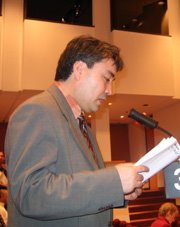
[ This report does not necessarily reflect the views of the United Nations]
© Alex Jerebbo/IRIN
Mohamed Tohti says Uighurs are under
pressure from China throughout Central Asia
ANKARA, 5 May 2006 (IRIN) - Many Uighurs live in exile in Central Asia after fleeing repression in their native Xinjiang Province - a vast region that occupies one-sixth of China's land mass.
The emergence of the five independent states in Central Asia following the collapse of the Soviet Union in 1991 stimulated a separatist movement among the Uighur minority in China’s Xinjiang Uighurs Autonomous Region (XUAR).
Uighurs are a Turkic, Sunni Muslim people, with close cultural and linguistic ties to other ethnic groups in Central Asia, including Kyrgyz, Kazakhs, Uzbeks and Turkmen. Rights groups cite serious human rights abuses against the Uighurs, while Beijing has claimed it has been fighting "religious extremist forces" and "violent terrorists" in the region for more than a decade.
Mohamed Tohti, Vice-President of the WUC, in an interview with IRIN, spoke about how Uighurs living in Central Asia find themselves under increasing pressure from host governments reluctant to offend Beijing.
QUESTION: In what ways are Uighurs in Central Asia under threat from Beijing?
ANSWER: Since 1996 China has launched an intensive diplomatic and political campaign in the Central Asian countries to prosecute the Uighur democratic movement, Uighur refugees and even the leaders of the Uighur democratic movement.
China defines the Uighur “problem” as part of the "fight against three evils”, which are terrorism, religious extremism and separatism.
Q: What evidence do you have of the persecution of Uighurs in the region?
A: Since 1996, nearly 30 Uighurs, maybe more, have forcefully been sent back from Kazakhstan to China and been executed, disappeared or sentenced to long-term imprisonment. It is the same in Kyrgyzstan as well. Now China's police are openly active on those countries’ streets.
The recent arrest of Canadian citizen Huseyin Celil [an ethnic Uighur detained in the Uzbek capital Tashkent facing extradition to China] is another example. This is proof of the extension of the Chinese hand in those countries to prosecute Uighurs. At the same time it is a message to all Uighurs living in the West.
The message is clear: "We do whatever we want, wherever we want, regardless of your citizenship, if you are critical of China and if you continue to advocate for the rights of Uighurs.”
In March 2003 a bus taking Uighur vendors from Bishkek to Kashgar [capital of Xinjiang] was attacked and 21 people were killed. They were shot before the bus was torched, nobody has been held responsible for this.
Dilbrim Samsaqova was elected member of the East Turkestan National Congress in early 2000 in Kazakhstan. She was a Kazakh citizen but a strong critic of China's treatment of Uighurs. She was murdered, but those responsible for this crime have not been found yet. And there are many other such cases.
Q: What do Uighurs want, independence from China?
A: Uighurs and Uighur organisations want to be the voice of Uighur people in East Turkestan [China’s Xinjiang Uighurs Autonomous Region (XUAR)] who have no voice. Let them decide their own political future. Let them have the right to self-determination. That is goal we are fighting for, but by rejecting any kind of violence.
Article Source






No comments:
Post a Comment